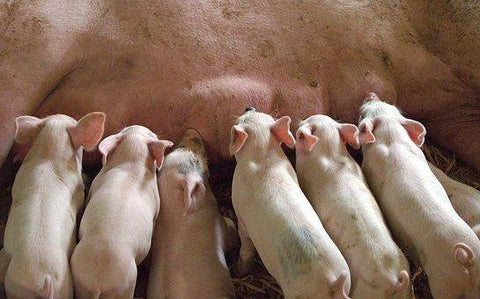Understanding Nutrition For Pets And Its Role In their Health

The science of nutrition is a recent development. It is an applied discipline that incorporates concepts from chemistry, biochemistry, and physiology, among other fields of study.
Animal nutrition concerns the dietary requirements of working, companion, or support animals. The science of preparing or formulating feed for animals that generate food (like meat or milk) or non-food items is known as animal feeding (e.g., wool). The various processes by which an animal assimilates food and utilizes it for its growth, health, and performance make animal nutrition another integrative science (e.g., meat, milk, and egg production and service).
Animal Nutrition

An animal's nutrition is crucial because it promotes development, health, and strength, just as it does for humans. To sustain acceptable animal performance during development, growth, and breeding, it is essential to maintain good quality nutrition in their diets.
More food is needed to feed a growing population, which places more strain on agriculture as it tries to keep up with demand. The expense of raising animals that will one day be used to produce food is largely accounted for by their nutrition, and as the world's population grows, so does the number of animals kept on each farm. As the world's population grows, so will the demand for various animal protein sources will grow.
Categories of Animal Nutrition
Seven nutrient categories are necessary for animal growth, reproduction, and consumption. Carbohydrates, fats, fiber, minerals, proteins, vitamins, and water are among these elements.
Protein
Proteins and lipids supply the structural components needed to develop muscle and aid the animal's growth. Protein is the building block of many bodily structures, including the epidermis, hair, and muscles. When proteins are broken down, essential enzymes are created for normal bodily processes. Amino acids in proteins allow an animal's organism to produce new proteins. Amino acids must be consumed in the animal's diet because they are unable to be produced by the animal internally.
Carbohydrates
The body uses carbohydrates as a source of energy to operate. By contributing to the production of other chemicals used by the body, they also meet other requirements. The body uses carbohydrates for various processes, including metabolism, development, and movement. Starch, which can produce either basic or complex sugars, is how they store energy. Slow-releasing complex carbohydrates, like polysaccharides, provide energy. These nutrients are provided to animals in their feed in the shape of grains.
Water
For a mammal to be healthy, water is necessary. Some people believe drinking water is more essential than food because dehydration can cause serious health problems. Within an animal's body, water is used to maintain hydration, control temperature and avoid overheating, regulate pH, and aid in digestion, joint lubrication, and energy production, among many other functions. Animals must always have access to clean, fresh water.
Nutritional Value of Animals
Like people, livestock animals require a balanced diet that includes all the necessary vitamins, minerals, fluids, and nutrients. Your animals will have the energy to develop, grow, and reproduce and a powerful immune system to ward off infections if they are fed properly. All of these benefits result in more successful and environmentally friendly agribusiness.
Ensure that every ration meets each animal's essential dietary needs at each stage, whether you give your livestock commercial feeds like concentrates or on-farm foods.
Pet Fresh dog food offers a nutritious and wholesome meal for your canine companion, crafted with high-quality ingredients to support their overall health. Its balanced formula ensures that your furry friend receives essential nutrients while savoring a delicious and carefully prepared meal every time.
Benefits of Animal Nutrition
1. Prevent Illnesses, Deficiencies, and Malnutrition

Livestock animals can get hundreds of diseases because of poor nutrition. Most of these diseases are brought on by either mineral and vitamin deficiency or malnutrition. Deficiencies and malnutrition negatively impact animals' growth, development, and production; severe conditions can even result in fatalities.
Modern farming practices have made nutrition-related illnesses a bigger issue. Since most animals consume concentrates created to increase yield, they may be deficient in certain vital minerals and vitamins. Add high-value supplements to your livestock feeds, such as B12 supplements and salt-based additives holding different micro and macro minerals.
2. Boost Reproduction

According to several studies, there is a clear link between nutrition and an animal's ability to reproduce. An animal's reproductive health is significantly impacted by feeding practices, ration quality and amount, and, more importantly, the nutritional value of feeds.
Lack of certain minerals, such as calcium, zinc, magnesium, selenium, and manganese, can make heifers less fertile by raising the risk of mastitis and placental retention and off-balancing the hormones that regulate gestation and delivery. In severe instances, improper nutrition can result in high calf mortality rates, stunted growth after delivery, and poor fetal development.
3. Improve Production

In general, excellent nutrition encourages healthy living in livestock, which increases productivity. Cattle and poultry fed well will generate more milk, meat, and eggs. Although gross production numbers are the foundation of every agribusiness, yield volume only tells part of the tale.
Consumer preferences for food product quality have significantly altered over the last ten or so years. The market for agricultural products grown using sustainable practices is expanding. Particular pressure is being put on the livestock business to use humane farming methods. Rich food increases yields while also raising the standard of livestock produce.
Bottomline
The study of nutrition is the culmination of numerous biochemical and physiological processes that change the components of food and feed into the bodily constituents needed to support life, growth, health, and productivity. In farm animals like livestock, pigs, and poultry, nutrition is crucial for preventing the loss of nutrients that aren't digested, keeping the quality of food products (like meat, milk, and eggs), and lowering production costs. Therefore, formulating rations and developing feeding practices for improving food production efficiency while safeguarding the environment and keeping the nutritional value of animal foods requires a fundamental grasp of nutrition concepts.






















0 comments